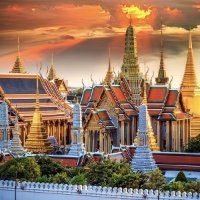Thai politics: The Green Revolution that did more harm than good
-
Recently Browsing 0 members
- No registered users viewing this page.
Announcements
-
Topics
-
Latest posts...
-
10
iPhone 16 Launch Draws Large Crowds in Thailand
Over priced, certainly, over hyped, definitely, rubbish not so much. It does just the same job as an ordinary smart phone that comes in at half the price or less. The people that rush to buy them are simply showing off, and will never use most of the functions anyway. -
302
Solar - 8kW Hybrid Inverter w/10kWh (upgraded to 20kWh in Sept. 2022) ESS/battery (not DIY)
Sadly, our Solar System has hit a milestone, with our digital meter, installed about 2 weeks after Solar was installed, and almost 25 months to the day, on the digital meter. It broke the 1000kWh mark ... That's the same, as a few of our one month Solar production & consumptions numbers. Took 25 months instead of 30 days. So not quite 'off grid' ... average 40kWh a month, for ~฿130 a month. Damn overcast skies & owning a BEV car. Somedays, you just got to use the grid to charge the car. Like today, since overcast this week, haven't bothered. Then the bank calls and tells you that your visa extension paperwork is ready. Say what, only took 3 days instead of a week. Oh crap ... got to charge the car. And now, charging, as ran it down to 28%, going to Imm office about 250kms R/T. And plan on going O&A tomorrow 🙄 On the flip side, have produced 16+ MWh & consumed 15+ MWh. For a saving from PEA of ~฿64,000 without even considering the petrol savings of what it would cost for 17k kms for of liters of 91 @ ฿36 (~฿43.7k) Guesstimate would be about 250kWh went to house/inverter, average 10kWh a month & 750+ going to the BEV (car), average 30kWh a month. -
10
iPhone 16 Launch Draws Large Crowds in Thailand
Never mind. Coming soon you can hand over lots of your money for something you basically already have. I guess you can show off for a while with your new phone until you have to fork out even more money for the next NEW Phone. -
10
iPhone 16 Launch Draws Large Crowds in Thailand
Give it about a week and then go onto the official Apple flagship store on Lazada and order one and have it delivered. No stress. -
10
iPhone 16 Launch Draws Large Crowds in Thailand
So what is the price of an unplugged new iPhone in Thailand? -
242
What’s the best area in Thailand for expats to settle for long-term living?
I've recently lived in both towns. Luang Prabang is still as beautiful as before, but the numbers of 'locust' tourists in increasing rapidly since the train line opened. Plus the burning season pollution gets worse every year (and that is what finally drove me to leave..). Vang Vieng might be OK for a short holiday, but as a long-term stay it is definitely not! Thinking of relocating from Luang Prabang, I stayed in VV for 2 weeks, riding around by motorbike to seek out houses to rent. The choice was abysmal - everything was targeted at short-stay tourists. Plus eateries were expensive and 'useful' shops (supermarkets etc) almost non-existant. -
77
Does Donald Trump Have Dementia?
Of course not, but when people have dementia they often say things that are not acceptable. -
67,783
Worst Joke Ever 2024
Close. Perhaps you should have looked up Boy George, here. https://www.youtube.com/watch?v=5MdOYG4SZjM I always thought that he was a bit "different", but I did enjoy his music. -
111
Kamala Harris Expresses Openness to Exploring Reparations for Slavery
Stop lying. She has never promised such a bill.will reach her desk. It's not her fault that the fascists killed Roe. She'll clearly do what she can. -
44
Tourist sim unlimited
I'm not expert on Internet but I noticed one thing; If you use VPN it robs lot of speed! VPN from overseas needs over over 100/100Mbps. In same country only 20/20. -
12
Teamsters’ Neutral Stance: A Blow to Harris and a Challenge for Trump
You have called VP Harris a fraud. OK. What fraudulent acts has she committed and why has she not been prosecuted or sued for these fraudulent acts. There are enough activist Republican Governors (e.g. Desantis, Abbot) who can bring charges if there are actionable offences. You are quick to make claims, now identify the fraudulent acts. To help you out, here are some guidelines: Your personal bias does not substantiate a crime of fraud. On the other hand, 34 convictions on felony against Trump do support calling Trump a fraud. Trump's multiple bankruptcies do not mean he is a fraud, just either an incompetent business person and/or dishonest. Trump's multiple legal cases related to his failure to pay contractors may suggest fraud, but they are not. Perhaps, mean, greedy and dishonest. -
111
Kamala Harris Expresses Openness to Exploring Reparations for Slavery
But a position, a policy, has to be workable. It has to have a chance of success at least. How can she promise she'll pass an abortion law when the circumstances clearly tell everyone she can't do it? -
12
Teamsters’ Neutral Stance: A Blow to Harris and a Challenge for Trump
If a teamster says that about you, then you know you're a good negotiator. Would you rather have a smiley cackling laugh puppet or a tough SOB as president?- 1
-

-
2
SSRIs In Thailand
Thank you for your clarifications and concern. After I made my OP earlier, I looked at the box and realized it is indeed made in India and is then distributed through a local Thai pharmaceutical company. I already have some experience with antidepressant medication. Around 10 years ago, a Thai doctor put me onto Deanxit for an off label use. I think I took it for around 8 to 10 months and it helped me quite a bit for the needed purpose. In fact, I might have stayed on it a bit longer, but at the time I had eventually read some things about the dangers of that drug and how it wasn't even approved for use in the USA, the UK and most of Europe. It's manufactured by a European company, but yet it's only really used in India, Thailand, and a few other developing countries. From some studies I read, which were conducted in India, it turns out the drug is fairly high risk for seizures as well as some other issues. So that is why it's probably not approved for use in most countries and was the main reason I stopped it abruptly. The doctor who put me on it probably wasn't aware of the dangers, unfortunately. In hindsight, I wish I was given a different drug instead, but we can't change the past. And after I stopped taking it, there were luckily no issues and I also realized that I didn't need it any longer anyway. By comparison, Escitalopram is a much milder drug, and I had no noticeable side effects from using Deanxit for close to a year, so I think I should be fine. My plan is to only use it for a few months at most to help reduce some anxiety, but I'll try it for a month first, and if it's not working well for me, then I'll just stop. It's possible by then I may not even need it any longer. It's not something I'm planning on using long-term, so I'm less concerned about general side effects. Also, I've studied all three of the drugs I mentioned pretty closely and Escitalopram seems to have the least number of side effects overall than the others. So it sounds like it's the most conservative choice as well. -
111
Kamala Harris Expresses Openness to Exploring Reparations for Slavery
That's her position. You're talking about process. She can appoint judges.
-
.png.3b3332cc2256ad0edbc2fe9404feeef0.png)










Recommended Posts
Create an account or sign in to comment
You need to be a member in order to leave a comment
Create an account
Sign up for a new account in our community. It's easy!
Register a new accountSign in
Already have an account? Sign in here.
Sign In Now